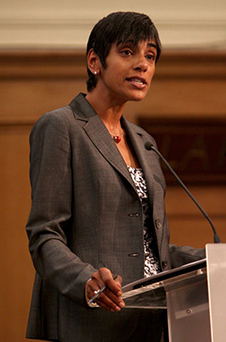6 Interview with Reeta Chakrabarti
In this section you will listen to an interview with BBC correspondent Reeta Chakrabarti, whose plurilingual background and life experience illustrate key themes of this course. Reeta Chakrabarti was born in England to Bengali parents, who spoke English to their daughter but Bengali to each other. She learned French at school and then at university, where her course also included a year abroad in France. Reeta has worked for the BBC since the 1990s and has been a political correspondent in Westminster since 1999. In an interview recorded for this course, she reflects about aspects of different languages and cultures that have shaped her identity.
Activity 49
Listen to Reeta Chakrabarti’s account of her time at school in India and her thoughts on how languages affect encounters with other people. Make a note of the key points she mentions under each of the headings below.
Transcript: Reeta Chakrabarti
Multicultural experience in an English-medium school in India:
Answer
Reeta Chakrabarti loved her experiences at this school. Her classmates came from all over the world, so were from different national, cultural and linguistic backgrounds. They all spoke English as a lingua franca, but some Bengali was also spoken.
Different levels of competency French and Bengali:
Answer
Reeta Chakrabarti’s French is a result of her decision to study the language at university. She has literary French (from her university study) and her spoken French (acquired during her year abroad) is good, but her written French is less developed.
Bengali is largely a spoken language for her.
Value of any level of language skills:
Answer
Reeta Chakrabarti says that you need to speak the language to ‘get under the skin of a culture’ which means that you can make very immediate connections with people. Speaking even a few words is usually appreciated by locals and you often get on better with people if you share a language. She recounts an incident in a market in Calcutta, where her language skills allowed her to overhear two local women talking about her. However, these language skills also helped her to defuse the situation, resulting in a ‘warm exchange’ with the women, that ‘brought [them] together’.
The way people express themselves in different languages affects how others see them:
Answer
Reeta Chakrabarti recounts how her uncles tease her for speaking Bengali like a child. She says she may ‘become a bit younger’ when she speaks Bengali because she is feeling her way round the language.
Reeta Chakrabarti mentions the example of a French teacher friend who sounded ‘artificial and simpering’ when she spoke English, which was not something Reeta had picked up from speaking French with her.

